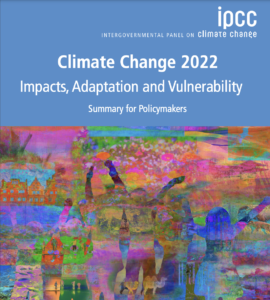Article written by SI Advocacy Advisor, Bev Bucur.
In February 2022, the UN’s Intergovernmental Panel on Climate Change (IPCC) released a report recognising the devastating and deadly consequences of climate inaction for humanity.

Climate Change 2022: Impacts, Adaptation and Vulnerability
The report acknowledges the interdependence of climate, ecosystems and biodiversity, and human societies. According to the report, we don’t have much time left to change course and save our world. Reliance on fossil fuels is leading us on a pathway to double the 1.5°C limit agreed in Paris. It details how a warming world threatens people and planet, and warns the window for action is narrowing, and that we need to prepare for more changes to come. Trends such as biodiversity loss, unsustainable consumption of natural resources, land and ecosystem degradation, rapid urbanisation, human demographic shifts, and social and economic inequalities are factors exacerbating the process.
We know that the most vulnerable are most affected by climate change. Globally, women are more likely to experience poverty and to have less socioeconomic power than men. This makes it difficult for them to recover from disasters which impact infrastructure, jobs and housing. Women are often responsible for gathering and producing food, collecting water and sourcing fuel for heating and cooking. With climate change, these tasks are becoming more difficult.
Despite women being disproportionately affected by climate change, women play a crucial role in climate change adaptation and mitigation. Women have the knowledge and understanding of what is needed to adapt to changing environmental conditions and to come up with practical solutions. Lack of financial resources, access to training and technology, land rights and limited access to political decision-making often prevent them from playing a full role in tackling climate change and other environmental challenges.
Climate Change is the most complex and urgent challenge of our time. Women are proven to lead the way towards more equitable and sustainable solutions to climate change. Women’s innovations and expertise have transformed lives and livelihoods, and increased climate resilience and overall well-being. Women must be included in all levels of decision making.
Actions we can take to stop Climate Change:
- Urge your government to take bold climate actions;
- Invest in and encourage using renewable energy sources;
- Use energy wisely in your home;
- Drive less;
- Use less water;
- Eat sustainably – eat less meat and dairy and more local produce;
- Advocate in your local community.

Stockholm +50 a healthy planet for the prosperity of all – our responsibility, our opportunity.
On 2-3 June, 2022, the environmental community will come together in Sweden to recognise the 50th Anniversary of the United Nations Conference on the Environment. The Conference will focus on the importance of multilateralism in tackling the Earth’s triple planetary crisis – climate, nature, and pollution.
Learn more https://www.stockholm50.global
Take the survey:
https://www.stockholm50.global/state-planet-global-public-survey

